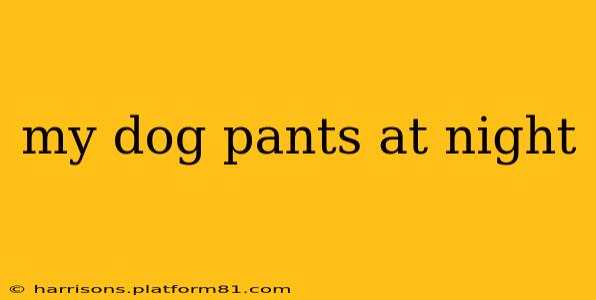Many dog owners find themselves wondering, "Why does my dog pant at night?" While panting is a normal canine behavior used to regulate body temperature, nighttime panting can signal underlying issues. This comprehensive guide explores the common reasons behind nighttime panting in dogs, offering insights into when it's a cause for concern and when it's simply a harmless habit.
Why Does My Dog Pant at Night Even When It's Cool?
This is a frequent concern among dog owners. Even in a cool room, several factors can trigger nighttime panting:
-
Stress or Anxiety: Just like humans, dogs can experience stress and anxiety that manifest physically, including panting. Separation anxiety, fear of thunderstorms, or even a change in routine can all contribute to nighttime panting. Observe your dog's behavior throughout the day to identify potential stressors.
-
Underlying Medical Conditions: Panting can be a symptom of various health issues, including heart disease, kidney disease, Cushing's disease, or even pain. If panting is accompanied by other symptoms like lethargy, vomiting, or changes in urination/defecation, it's crucial to consult a veterinarian immediately.
-
Discomfort: Is your dog sleeping on an uncomfortable surface? Is their bedding too hot or too cold? A simple adjustment to their sleeping environment might resolve the issue.
-
Medication Side Effects: Some medications can cause panting as a side effect. If your dog is on any medication, discuss this with your vet.
Is Panting at Night a Sign of Pain?
Yes, excessive panting, especially when coupled with other signs like whining, limping, or changes in behavior, can indicate pain. Your dog may be experiencing pain from an injury, arthritis, or another underlying condition. If you suspect pain, veterinary attention is essential.
What Should I Do If My Dog Pants Excessively at Night?
The first step is to observe your dog carefully. Note the frequency and intensity of the panting, as well as any accompanying symptoms.
-
Rule out environmental factors: Ensure the room is comfortably cool and your dog has a comfortable sleeping area.
-
Address potential stressors: Try to identify and alleviate any sources of stress or anxiety in your dog's environment.
-
Consult your veterinarian: If the panting is excessive, persistent, or accompanied by other symptoms, schedule an appointment with your veterinarian. They can conduct a thorough examination to rule out any underlying medical conditions.
When Should I Be Most Concerned About My Dog Panting at Night?
You should be particularly concerned if the panting is:
- Excessive and persistent: Panting that lasts for extended periods or is significantly more pronounced than usual.
- Accompanied by other symptoms: Lethargy, weakness, vomiting, diarrhea, changes in urination or defecation, unusual thirst or urination, weight loss, or changes in appetite.
- Sudden onset: If your dog suddenly starts panting heavily at night without any apparent reason.
My Dog Pants Heavily at Night, What Could It Be?
The causes are numerous, as detailed above. It could be something as simple as a warm room or as serious as a medical condition. A vet visit is crucial for a proper diagnosis. Don't attempt to self-diagnose; a professional assessment is vital.
How Can I Help My Dog Stop Panting at Night?
The best approach depends on the underlying cause. If stress is a factor, consider calming aids like pheromone diffusers or calming treats (always consult your vet before introducing new supplements). If a medical condition is involved, your vet will recommend appropriate treatment. Addressing environmental factors—like providing a cool and comfortable sleeping area—is always a good starting point.
This information is for general knowledge and does not substitute professional veterinary advice. Always consult your veterinarian for any concerns about your dog's health.
